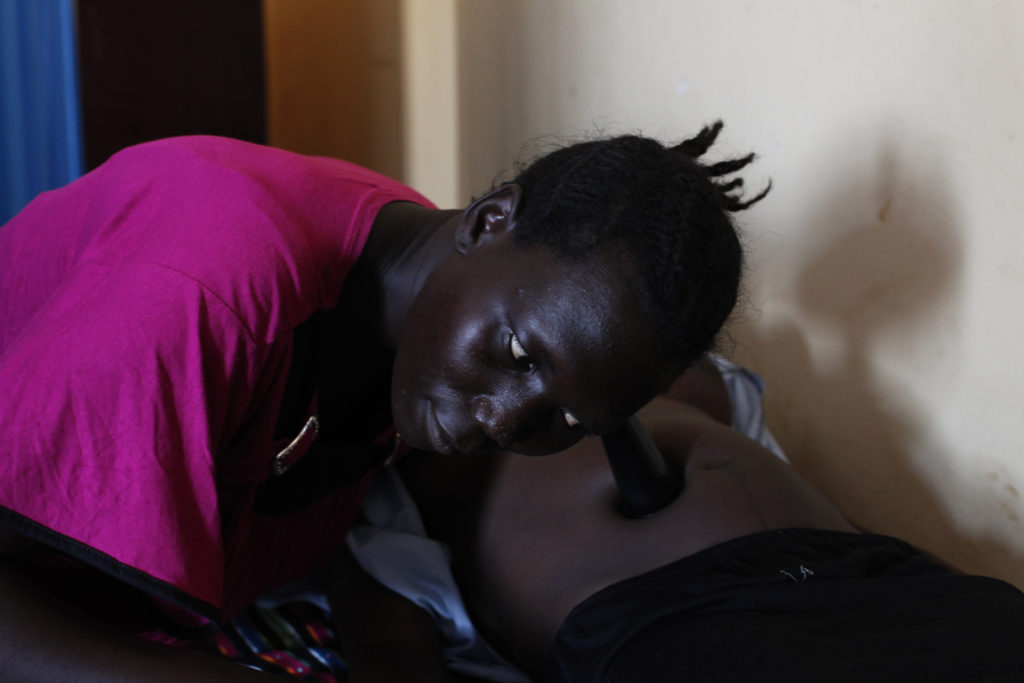Male involvement in Family Planning

Access to basic reproductive health information and services would reduce South Sudan’s staggering number of maternal deaths. It would also help bring down the high infant mortality rate and improve the quality of life for the mothers and children.
South Sudan has one of the worst reproductive health situations in the world with an estimated maternal mortality ratio of 789 per 100,000 live births, and a contraceptive prevalence rate of around 5%,. These statistics are due to a combination of factors and challenges which affect the health seeking behaviours of communities and individuals.
The challenges
Most of the challenges faced in the area of family planning can be grouped under lack of information, myths and misconceptions. Rumours and misconceptions about contraceptives are widespread, and many men and women are opposed to family planning. Societal and peer pressure to have numerous children among some communities also contribute to poor health practices and neglect of some of the family planning measures and interventions.
Male involvement strengthens continuity and acceptance of family planning methods. As much as the clients have their right to decision, often a lack of family agreement has led to a lack of support and continuity to contraceptive methods amongst some married couples. Community awareness and influence can also have a negative or positive impact on some important decisions such as the permanent methods.
Provision of family planning to communities
Through support from Health Pooled Fund, World Vision is providing maternal, newborn and child health services in Maridi hospital in Western Equatoria state. Through outreaches and the collaborative involvement of the facility health committee and the county health department, the number of patients seeking medical services from the hospital has increased.
Janet*, a mother of two visited the hospital’s antenatal clinic. She was accompanied by her husband Paul*. She was expecting her third child and was referred to have a scan to ensure all was well with her baby. The scan revealed that all was well and she was booked in for delivery.
Janet delivered her two children through caesarean delivery and this was to be the case again. The midwife in the maternity ward discussed with the couple the possible high risks of subsequent pregnancies that could occur after the third caesarean section and shared with the couple the different contraceptive methods that would keep her safe and free from the risk of pregnancy related complications.
Janet and Paul welcomed the counselling and opened up to discuss the various methods that were available.
“I have been very worried about my wife’s delicate situation especially with the operations during delivery. We have opted for a permanent contraceptive because any more children will put her life in danger,” said Paul.
Janet was equally optimistic with her husband accepting and endorsing family planning. “I am happy he agreed that we stop having more children. Most men in our community do not want anything to do with family planning and often resort to different ways to ensure that women do not use any contraceptives,” Janet explained.
Although the couple had made a decision on what they wanted, in South Sudan family ties are very strong. Paul proposed that they inform Janet’s mother about their decision and also get her endorsement.
Janet’s mother was elated by their acceptance of family planning explaining that she had been very worried of her daughter’s health. She explained that since she learnt of Janet’s third pregnancy, she was worried because she knew Janet would never have a normal delivery. “I am happy they have adopted family planning,” she added.
When women are empowered to choose the number, timing and spacing of their children, they are not only healthier, they are also better able to pursue opportunities – such as jobs or schooling – to reduce the grinding poverty that affects more than half of South Sudan’s population.
New trends
Culturally, South Sudanese men head households and hold decision-making powers. A new trend has emerged where men recognise the need to seek professional health care for their wives when pregnant. Through health talks and outreaches in the communities, men and women have been empowered to recognise that maternal health during pregnancy is ensured through providing nutritious food, decreasing the woman’s housework and seeking care promptly if there are any complaints.
Through positive reinforcement and male champions, husbands have started taking their wives to antenatal care either in Maridi hospital. There is a similar trend in the other health facilities within Maridi County.
